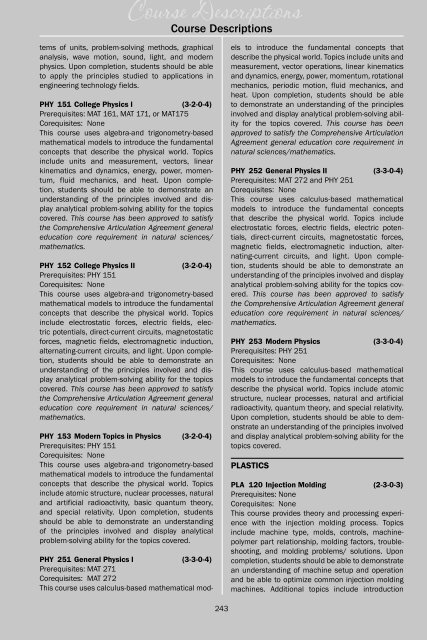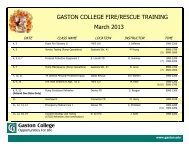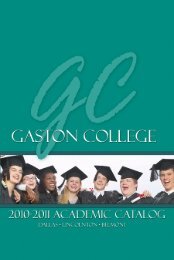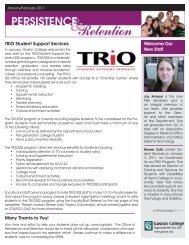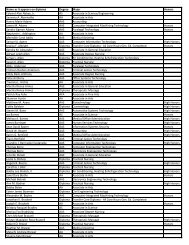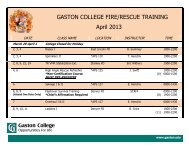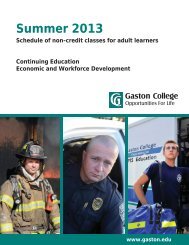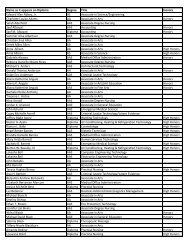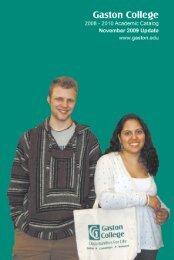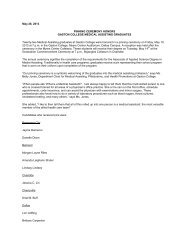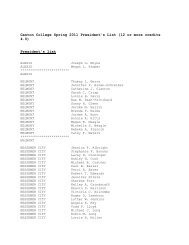Course DescriptionsCourse DescriptionsPSF 214 Health and Fitness Law (3-0-0-3)Prerequisites: Enrollment in Health and FitnessScience Program or DepartmentalApprovalCorequisites: NoneThis course is designed to build a greater awarenessand understanding of laws and legal issues encounteredin the health and fitness industry. Topicsinclude federal/state regulations, historical/currentpractices, risk management, torts, employment,discrimination, contracts, waivers, health/fitnessscreening, client confidentiality, facility safety, equipmentliability, and emergency procedures. Uponcompletion, students should be able to demonstratean understanding of the legal system to prevent orminimize liability in a fitness setting.PSF 218 Lifestyle Changes & Wellness (3-2-0-4)Prerequisites: Enrollment in Health and FitnessScience Program or DepartmentalApprovalCorequisites: NoneThis course introduces health risk appraisals andtheir application to lifestyle changes. Topics includenutrition, weight control, stress management, andthe principles of exercise. Upon completion, studentsshould be able to conduct health risk appraisalsand apply behavior modification techniques in afitness setting.PHYSICSPHY 110 Conceptual Physics (3-0-0-3)Prerequisites: RED 090 and MAT 070Corequisites: PHY 110AThis course provides a conceptually-based exposureto the fundamental principles and processes of thephysical world. Topics include basic concepts ofmotion, forces, energy, heat, electricity, magnetism,and the structure of matter and the universe. Uponcompletion, students should be able to describeexamples and applications of the principles studied.This course has been approved to satisfythe Comprehensive Articulation Agreement generaleducation core requirement in natural sciences/mathematics.PHY 110A Conceptual Physics Lab (0-2-0-1)Prerequisites: NoneCorequisites: PHY 110This course is a laboratory for PHY 110. Emphasisis placed on laboratory experiences that enhancematerials presented in PHY 110. Upon completion,students should be able to apply the laboratoryexperiences to the concepts presented in PHY110. This course has been approved to satisfythe Comprehensive Articulation Agreement generaleducation core requirement in natural sciences/mathematics.PHY 121 Applied Physics I (3-2-0-4)Prerequisites: NoneCorequisites: NoneThis algebra-based course introduces fundamentalphysical concepts as applied to industrial and servicetechnology fields. Topics include systems ofunits, problem-solving methods, graphical analyzes,vectors, motion, forces, Newton’s laws of motion,work, energy, power, momentum, and properties ofmatter. Upon completion, students should be ableto demonstrate an understanding of the principlesstudied as applied in industrial and service fields.PHY 122 Applied Physics II (3-2-0-4)Prerequisites: NoneCorequisites: NoneThis algebra-based course introduces fundamentalphysical concepts as applied to industrial and servicetechnology fields. Emphasis is placed on systemsof units, problem-solving methods, graphicalanalysis, static electricity, AC and DC circuits, magnetism,transformers, AC and DC motors, and generators.Upon completion, students should be ableto demonstrate an understanding of the principlesstudied as applied in industrial and service fields.PHY 131 Physics-Mechanics (3-2-0-4)Prerequisites: MAT 121, MAT 161, MAT 171, orMAT 175Corequisites: NoneThis algebra/trigonometry-based course introducesfundamental physical concepts as applied to engineeringtechnology fields. Topics include systems ofunits, problem-solving methods, graphical analysis,vectors, motion, forces, Newton’s laws of motion,work, energy, power, momentum, and properties ofmatter. Upon completion, students should be ableto apply the principles studied to applications inengineering technology fields.PHY 132 Physics-Elec & Magnetism (3-2-0-4)Prerequisites: PHY 131Corequisites: NoneThis algebra/trigonometry-based course is a studyof fundamental physical concepts as applied to engineeringtechnology fields. Topics include systems ofunits, problem-solving methods, graphical analysis,waves, electricity, magnetism, circuits, transformers,motors, and generators. Upon completion, studentsshould be able to apply the principles studied toapplications in engineering technology fields.PHY 133 Physics-Sound & Light (3-2-0-4)Prerequisites: PHY 131Corequisites: NoneThis algebra/trigonometry-based course is a studyof fundamental physical concepts as applied toengineering technology fields. Topics include sys-242
Course DescriptionsCourse Descriptionstems of units, problem-solving methods, graphicalanalysis, wave motion, sound, light, and modernphysics. Upon completion, students should be ableto apply the principles studied to applications inengineering technology fields.PHY 151 <strong>College</strong> Physics I (3-2-0-4)Prerequisites: MAT 161, MAT 171, or MAT175Corequisites: NoneThis course uses algebra-and trigonometry-basedmathematical models to introduce the fundamentalconcepts that describe the physical world. Topicsinclude units and measurement, vectors, linearkinematics and dynamics, energy, power, momentum,fluid mechanics, and heat. Upon completion,students should be able to demonstrate anunderstanding of the principles involved and displayanalytical problem-solving ability for the topicscovered. This course has been approved to satisfythe Comprehensive Articulation Agreement generaleducation core requirement in natural sciences/mathematics.PHY 152 <strong>College</strong> Physics II (3-2-0-4)Prerequisites: PHY 151Corequisites: NoneThis course uses algebra-and trigonometry-basedmathematical models to introduce the fundamentalconcepts that describe the physical world. Topicsinclude electrostatic forces, electric fields, electricpotentials, direct-current circuits, magnetostaticforces, magnetic fields, electromagnetic induction,alternating-current circuits, and light. Upon completion,students should be able to demonstrate anunderstanding of the principles involved and displayanalytical problem-solving ability for the topicscovered. This course has been approved to satisfythe Comprehensive Articulation Agreement generaleducation core requirement in natural sciences/mathematics.PHY 153 Modern Topics in Physics (3-2-0-4)Prerequisites: PHY 151Corequisites: NoneThis course uses algebra-and trigonometry-basedmathematical models to introduce the fundamentalconcepts that describe the physical world. Topicsinclude atomic structure, nuclear processes, naturaland artificial radioactivity, basic quantum theory,and special relativity. Upon completion, studentsshould be able to demonstrate an understandingof the principles involved and display analyticalproblem-solving ability for the topics covered.PHY 251 General Physics I (3-3-0-4)Prerequisites: MAT 271Corequisites: MAT 272This course uses calculus-based mathematical modelsto introduce the fundamental concepts thatdescribe the physical world. Topics include units andmeasurement, vector operations, linear kinematicsand dynamics, energy, power, momentum, rotationalmechanics, periodic motion, fluid mechanics, andheat. Upon completion, students should be ableto demonstrate an understanding of the principlesinvolved and display analytical problem-solving abilityfor the topics covered. This course has beenapproved to satisfy the Comprehensive ArticulationAgreement general education core requirement innatural sciences/mathematics.PHY 252 General Physics II (3-3-0-4)Prerequisites: MAT 272 and PHY 251Corequisites: NoneThis course uses calculus-based mathematicalmodels to introduce the fundamental conceptsthat describe the physical world. Topics includeelectrostatic forces, electric fields, electric potentials,direct-current circuits, magnetostatic forces,magnetic fields, electromagnetic induction, alternating-currentcircuits, and light. Upon completion,students should be able to demonstrate anunderstanding of the principles involved and displayanalytical problem-solving ability for the topics covered.This course has been approved to satisfythe Comprehensive Articulation Agreement generaleducation core requirement in natural sciences/mathematics.PHY 253 Modern Physics (3-3-0-4)Prerequisites: PHY 251Corequisites: NoneThis course uses calculus-based mathematicalmodels to introduce the fundamental concepts thatdescribe the physical world. Topics include atomicstructure, nuclear processes, natural and artificialradioactivity, quantum theory, and special relativity.Upon completion, students should be able to demonstratean understanding of the principles involvedand display analytical problem-solving ability for thetopics covered.PLASTICSPLA 120 Injection Molding (2-3-0-3)Prerequisites: NoneCorequisites: NoneThis course provides theory and processing experiencewith the injection molding process. Topicsinclude machine type, molds, controls, machinepolymerpart relationship, molding factors, troubleshooting,and molding problems/ solutions. Uponcompletion, students should be able to demonstratean understanding of machine setup and operationand be able to optimize common injection moldingmachines. Additional topics include introduction243
- Page 2 and 3:
PLEASE NOTETHE FOLLOWING ITEMS HAVE
- Page 4 and 5:
Student InformationTable of Content
- Page 6 and 7:
Student InformationMission Statemen
- Page 8 and 9:
Student Information2011-2012 Academ
- Page 10 and 11:
Student InformationAdmissionssectio
- Page 16 and 17:
Student InformationFinancial AidU.S
- Page 18 and 19:
Student InformationFinancial AidThe
- Page 20 and 21:
Student InformationEducational Prog
- Page 22 and 23:
Student InformationEducational Prog
- Page 24 and 25:
Student InformationCounselors or ad
- Page 26 and 27:
Student InformationPrograms of Stud
- Page 28 and 29:
Student InformationDevelopmental Ed
- Page 30 and 31:
Student InformationVarious institut
- Page 32 and 33:
Student InformationPolicies & Proce
- Page 34 and 35:
Student InformationPolicies & Proce
- Page 36 and 37:
Student InformationPolicies & Proce
- Page 38 and 39:
Student InformationPolicies & Proce
- Page 40 and 41:
Student InformationPolicies & Proce
- Page 42 and 43:
Student InformationStudent Services
- Page 44 and 45:
Student InformationCollege Transfer
- Page 46 and 47:
Student InformationCollege Transfer
- Page 48 and 49:
Student InformationCollege Transfer
- Page 50 and 51:
Student InformationCollege Transfer
- Page 52 and 53:
Student InformationCollege Transfer
- Page 54 and 55:
Student InformationCollege Transfer
- Page 56 and 57:
Student InformationCollege Transfer
- Page 58 and 59:
Degrees, Diplomas & CertificatesA.A
- Page 60 and 61:
Degrees, Diplomas & CertificatesA.A
- Page 62 and 63:
Degrees, Diplomas & CertificatesA.A
- Page 64 and 65:
Degrees, Diplomas & CertificatesA.A
- Page 66 and 67:
Degrees, Diplomas & CertificatesA.A
- Page 68 and 69:
Degrees, Diplomas & CertificatesA.A
- Page 70 and 71:
Degrees, Diplomas & CertificatesA.A
- Page 72 and 73:
Degrees, Diplomas & CertificatesA.A
- Page 74 and 75:
Degrees, Diplomas & CertificatesA.A
- Page 76 and 77:
Degrees, Diplomas & CertificatesA.A
- Page 78 and 79:
Degrees, Diplomas & CertificatesA.A
- Page 80 and 81:
Degrees, Diplomas & CertificatesA.A
- Page 82 and 83:
Degrees, Diplomas & CertificatesA.A
- Page 84 and 85:
Degrees, Diplomas & CertificatesA.A
- Page 86 and 87:
Degrees, Diplomas & CertificatesA.A
- Page 88 and 89:
Degrees, Diplomas & CertificatesA.A
- Page 90 and 91:
Degrees, Diplomas & CertificatesA.A
- Page 92 and 93:
Degrees, Diplomas & CertificatesA.A
- Page 94 and 95:
Degrees, Diplomas & CertificatesA.A
- Page 96 and 97:
Degrees, Diplomas & CertificatesA.A
- Page 98 and 99:
Degrees, Diplomas & CertificatesA.A
- Page 100 and 101:
Degrees, Diplomas & CertificatesA.A
- Page 102 and 103:
Degrees, Diplomas & CertificatesA.A
- Page 104 and 105:
Degrees, Diplomas & CertificatesA.A
- Page 106 and 107:
Degrees, Diplomas & CertificatesA.A
- Page 108 and 109:
Degrees, Diplomas & CertificatesDip
- Page 110 and 111:
Degrees, Diplomas & CertificatesDip
- Page 112 and 113:
Degrees, Diplomas & CertificatesDip
- Page 114 and 115:
Degrees, Diplomas & CertificatesDip
- Page 116 and 117:
Degrees, Diplomas & CertificatesDip
- Page 118 and 119:
Degrees, Diplomas & CertificatesDip
- Page 120 and 121:
Degrees, Diplomas & CertificatesDip
- Page 122 and 123:
Degrees, Diplomas & CertificatesDip
- Page 124 and 125:
Degrees, Diplomas & CertificatesCer
- Page 126 and 127:
Degrees, Diplomas & CertificatesCer
- Page 128 and 129:
Degrees, Diplomas & CertificatesCer
- Page 130 and 131:
Degrees, Diplomas & CertificatesCer
- Page 132 and 133:
Degrees, Diplomas & CertificatesCer
- Page 134 and 135:
Degrees, Diplomas & CertificatesCer
- Page 136 and 137:
Degrees, Diplomas & CertificatesCer
- Page 138 and 139:
Degrees, Diplomas & CertificatesCer
- Page 140 and 141:
Degrees, Diplomas & CertificatesCer
- Page 142 and 143:
Degrees, Diplomas & CertificatesCer
- Page 144 and 145:
Degrees, Diplomas & CertificatesCer
- Page 146 and 147:
Degrees, Diplomas & CertificatesCer
- Page 148 and 149:
Degrees, Diplomas & CertificatesCer
- Page 150 and 151:
Course DescriptionsKEY TO COURSE DE
- Page 152 and 153:
Course DescriptionsCourse Descripti
- Page 154 and 155:
Course DescriptionsCourse Descripti
- Page 156 and 157:
Course DescriptionsCourse Descripti
- Page 158 and 159:
Course DescriptionsCourse Descripti
- Page 160 and 161:
Course DescriptionsCourse Descripti
- Page 162 and 163:
Course DescriptionsCourse Descripti
- Page 164 and 165:
Course DescriptionsCourse Descripti
- Page 166 and 167:
Course DescriptionsCourse Descripti
- Page 168 and 169:
Course DescriptionsCourse Descripti
- Page 170 and 171:
Course DescriptionsCourse Descripti
- Page 172 and 173:
Course DescriptionsCourse Descripti
- Page 174 and 175:
Course DescriptionsCourse Descripti
- Page 176 and 177:
Course DescriptionsCourse Descripti
- Page 178 and 179:
Course DescriptionsCourse Descripti
- Page 180 and 181:
Course DescriptionsCourse Descripti
- Page 182 and 183:
Course DescriptionsCourse Descripti
- Page 184 and 185:
Course DescriptionsCourse Descripti
- Page 186 and 187:
Course DescriptionsCourse Descripti
- Page 188 and 189:
Course DescriptionsCourse Descripti
- Page 190 and 191:
Course DescriptionsCourse Descripti
- Page 192 and 193:
Course DescriptionsCourse Descripti
- Page 194 and 195: Course DescriptionsCourse Descripti
- Page 196 and 197: Course DescriptionsCourse Descripti
- Page 198 and 199: Course DescriptionsCourse Descripti
- Page 200 and 201: Course DescriptionsCourse Descripti
- Page 202 and 203: Course DescriptionsCourse Descripti
- Page 204 and 205: Course DescriptionsCourse Descripti
- Page 206 and 207: Course DescriptionsCourse Descripti
- Page 208 and 209: Course DescriptionsCourse Descripti
- Page 210 and 211: Course DescriptionsCourse Descripti
- Page 212 and 213: Course DescriptionsCourse Descripti
- Page 214 and 215: Course DescriptionsCourse Descripti
- Page 216 and 217: Course DescriptionsCourse Descripti
- Page 218 and 219: Course DescriptionsCourse Descripti
- Page 220 and 221: Course DescriptionsCourse Descripti
- Page 222 and 223: Course DescriptionsCourse Descripti
- Page 224 and 225: Course DescriptionsCourse Descripti
- Page 226 and 227: Course DescriptionsCourse Descripti
- Page 228 and 229: Course DescriptionsCourse Descripti
- Page 230 and 231: Course DescriptionsCourse Descripti
- Page 232 and 233: Course DescriptionsCourse Descripti
- Page 234 and 235: Course DescriptionsCourse Descripti
- Page 236 and 237: Course DescriptionsCourse Descripti
- Page 238 and 239: Course DescriptionsCourse Descripti
- Page 240 and 241: Course DescriptionsCourse Descripti
- Page 242 and 243: Course DescriptionsCourse Descripti
- Page 246 and 247: Course DescriptionsCourse Descripti
- Page 248 and 249: Course DescriptionsCourse Descripti
- Page 250 and 251: Course DescriptionsCourse Descripti
- Page 252 and 253: Course DescriptionsCourse Descripti
- Page 254 and 255: Course DescriptionsCourse Descripti
- Page 256 and 257: Course DescriptionsCourse Descripti
- Page 258 and 259: Course DescriptionsCourse Descripti
- Page 260 and 261: Course DescriptionsCourse Descripti
- Page 262 and 263: Administration, Faculty & StaffFacu
- Page 264 and 265: Administration, Faculty & StaffFacu
- Page 266 and 267: Administration, Faculty & StaffFacu
- Page 268 and 269: Administration, Faculty & StaffFacu
- Page 270 and 271: Administration, Faculty & StaffFacu
- Page 272 and 273: Administration, Faculty & StaffFacu
- Page 274 and 275: Administration, Faculty & StaffFacu
- Page 276 and 277: Administration, Faculty & StaffFacu
- Page 278 and 279: Administration, Faculty & StaffFacu
- Page 280 and 281: IndexIndex- C -Career Scholarships
- Page 282 and 283: IndexIndexIndustrial Systems Techno
- Page 284 and 285: MapsDallas (Main) Campus, Dallas, N
- Page 287: MapsKimbrell Campus & Textile Techn


